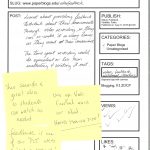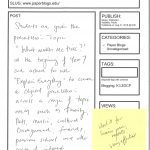You might think I’m overly critical of Ted Dintersmith, who probably really cares about education and the future of young people. When you watch Bill Gates tour High Tech High which he invested in years before it featured in Dintersmith and Wagner’s film, you get the sense that he probably really cares about young people, too. But we must not base policy on personality. Hoping that Dintersmith may be the anti-Gates we’ve been waiting for confines us such a superficial analysis of personality. When billionaires like Dintersmith get behind efforts led by private schools to reshape admissions to colleges, we need to put these education reform agendas through a rigorous, historical analysis. Maybe you will enjoy Dintersmith’s book for the tour he takes you on of schools across the U.S., but you’ll need to look elsewhere to understand what’s really at stake in the movement to ‘disrupt’ ‘obsolete’ schools.
Month: August 2018
An Idea Meritocracy is an environment in which the best idea wins. The best idea is determined by the quantity and quality of the data, not by positional power. I have studied examples of companies that have created Idea Meritocracies, including Google, Intuit, Pixar Animation Studios and Bridgewater Associates. In those organizations, an Idea Meritocracy has played a key role in driving consistent high performance and has warded off complacency and group think by empowering employees to have the curiosity and courage to challenge, to explore like scientists by asking the three W’s: Why? What if? Why not?
📑 20 Tech Tips in the Mathematics Classroom
20 Tech Tips in the Mathematics Classroom – Teacher Information, Robots and iPad Apps
Desmos – online graphing calculating system www.desmos.com
Desmos provides a range of questions and challenges associated with graphing (see Dan Meyer for more http://blog.mrmeyer.com/)
Graphing Stories – handouts, videos and stories associated with graphs www.graphingstories.com
Which One Doesn’t Belong – find a reason why each one does not belong wodb.ca/index.html
It is not about the answer, but about the discussion. The next step to Which One Doesn’t Belong is getting students to make their own
Maths Tweet Blogosphere exploremtbos.wordpress.com & https://twitter.com/ExploreMTBoS
What Can You Do With That? #WCYDWT https://blog.mrmeyer.com/2010/teaching-wcydwt-introduction/
Visual Patterns http://visualpatterns.org
Between 2 Numbers – If this then what www.between2numbers.com
Three Act Maths by Dan Meyer https://docs.google.com/spreadsheets/d/1jXSt_CoDzyDFeJimZxnhgwOVsWkTQEsfqouLWNNC6Z4/pub?output=html
101 Questions – pose questions based on a provocation www.101qs.com
Youcubed – a collect of tasks that could be used as starters www.youcubed.org
WolframAlpha – a space to ask computational questions www.wolframalpha.com
The move from a mac to a chromebook, and how that all went
These technologies provide amazing opportunities to provide real services to our lives. I experienced this first hand as we enjoyed our time in this road race, and will look forward to the next one together. I was impressed by the use of technology as I was interacting with these sources and signals. At the same time, I was still plagued by a number of questions as I was thinking about these tools, and other possible uses. In our current and future societies, we need to examine these uses and think about how or why we use these solutions.
When using technology, we need to be careful of rhetoric
It is not the technology that is disruptive, but what we do with the technology that is disruptive
When talking about technology we often get caught up in discussions of *evidence* and *return on investment*. The problem is that benefits can not necessarily be measured in the same way
We can talk about the effect size of technology, but the problem is that this does not capture the different ways that technology is used within the classroom
It is what the teacher does with the technology that will make the ultimate difference
The use of computers is more effective when: there is a diversity of strategies, pre-training, multiple opportunities, student in control, peer learning and feedback optimised.
We have to have the belief that when we implement technology that it will have the desired effects, such as student self-reporting, meta-cognition and clarity of learning
Steve Cutts provides some interesting provocations about technology http://www.stevecutts.com/illustration.html
What do Google’s DeepMind and IBM’s Watson mean for the future of school?
“Today content is ubiquitous and its’ free” Tony Wagner https://www.youtube.com/watch?v=JE5XRrfetu4
52,000,000,000, the estimated number of pages indexed by Google. Growing exponentially
Saroo’s story demonstrates problem-based literacy and numeracy approaches https://www.blog.google/products/maps/google-earth-25-year-search/
Google ‘Talk to Books’ offers a new AI approach to search beyond the indexed web https://books.google.com/talktobooks/
Google Search has changed the way that things are. Now we have technology that not only gives an answer, but also shows the process behind it
Kids today will expect the use of technology
What does it mean when students would rather do YouTube and check out of school?
The qualities required in the 21st Century need to go beyond the traditional foundations https://widgets.weforum.org/nve-2015/
Three stages of educational technology use via Sonny Magana: translational, transformational and transcendent
We need to think about school as it can be
Blogging in the Classroom
Using Doug Belshaw’s notion of ‘Digital Literacies, I will focus on critical thinking, creativity and communication. If a school wished that they could cover just about all the Digital Technologies Curriculum using blogging. Blogging has so many entry points that it can be differentiated to the needs of any learner and/or classroom.
Ongoing Reporting with GSuite
Using Doug Belshaw’s notion of ‘Digital Literacies, I will focus on critical thinking, creativity and communication. Although this does not necessarily cover coding, documentation and ongoing reporting covers most other aspects, such as data collection and creating digital solutions. The point of ongoing reporting is to be differentiated. The challenge is choosing the right solution for the problem at hand. This will be addressed in the session.
You can find a link to the resource to work through here. This is also something that I have .
It’s been almost six years since I rode in one of Google’s self-driving cars. I think about all the data that Google has amassed since then – all the mapping data and geolocation data and sensor data and historical data and traffic data and all the machine learning that their machines are supposedly doing with that. Why, it’s almost as if the problems of navigating the world with AI are much, much harder than engineers imagined.
Personally, I’d prefer to see greater investment in public transportation than in cars, and I’d rather hear stories that predict that sort of future.
Interestingly, that might be a more logical space for automation, especially trains.
A plan to build a multi-billion-dollar underground rail loop connecting Melbourne’s western and eastern suburbs via the airport, and link all major train lines, has been unveiled by the Victorian Labor Government.
Perhaps we need to have students include a toolography, a list — perhaps annotated — of the tools they used to source, to organise and to present their information.
I think shallow responses are kind of nice—sometimes you don’t have time to reply fully and it can be polite to just 👍. In fact, I sometimes go back to likes and flesh out the reply. So it acts like a bookmark, an ‘ack’ and a reminder to return. That’s not too shallow?
When I think about the teachers my daughter has had, there are a number of things that have stood out? For me, it has been relationships and a focus on strengths.
Originally posted at Read Write Collect











